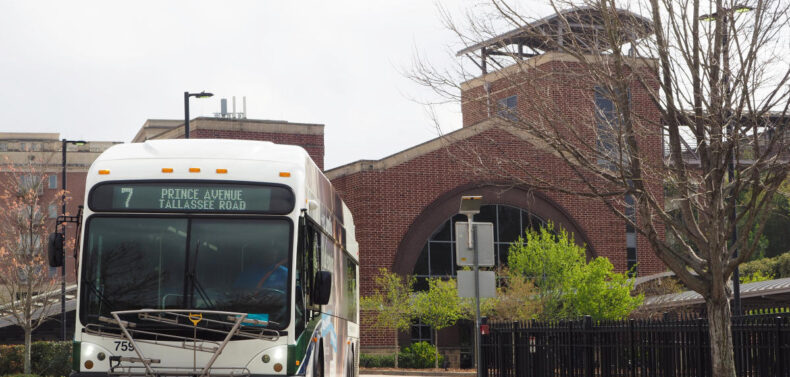Athens Transit is working on an update of its 10-year plan that could result in revamped or expanded bus routes, reinstating fares and extending service into surrounding counties.
Those are some of the topics transit officials and Athens-Clarke County commissioners discussed during a Nov. 14 work session. But the five-year update of the long-range plan won’t be completed until next spring.
Like other transit agencies nationwide, Athens Transit is facing a number of challenges, including a shortage of drivers and a decline in ridership during peak hours as many people continue to work from home or in hybrid jobs. Ridership just recently returned to its pre-COVID level with 1.4 million total riders in fiscal 2023, interim Transit Director Victor Pope told commissioners.
Commissioner Mike Hamby asked how the 2020 decision to go fare-free affected ridership, but transit officials said the decline was mostly due to the pandemic. Transit officials have also said they need to reinstate fares or find a new source of revenue if the commission wants to expand service. In a survey of more than 400 transit users, about a quarter said they would only take the bus if it was free, but stakeholders also said they want faster, more frequent service and for riders to contribute something to the cost.
Transit officials reached out to the UGA students, immigrant communities and carless households that are Athens Transit’s most frequent riders, hosting town hall meetings at UGA’s Memorial Hall, the multimodal center downtown and the Pinewoods mobile home park, receiving feedback from more than 400 people. Commissioner Dexter Fisher suggested reaching out to employers as well, and Commissioner Melissa Link wanted the department to consult with the United Campus Workers of Georgia union, which is seeking free parking for UGA staff.
Another challenge transit officials noted was “non-destination riders”—homeless individuals who hang around bus stops or ride the bus all day. Commissioner Jesse Houle questioned them about banning such people, especially those who are in recovery for substance abuse problems.
“We do need to have a conversation about what behaviors are permitted within the transit system,” Pope said. Some banned riders were reinstated because their offenses were minor, but some incidents that led to riders being banned involved threatening or harming others, he said.
As for potentially running buses into other counties, Mayor Kelly Girtz said no such conversations have taken place, but the idea makes sense. He noted that a lot of transit agencies serve multiple cities and counties. “People who are getting a bag of groceries or socks don’t think, ‘What jurisdiction am I in?’” he said.
As Athens is on the cusp of entering its fourth drought in less than 20 years, Public Utilities Director Hollis Terry spoke to commissioners about a new plan to provide water for the growing population through 2065.
In 2020 ACC bought the Rock Hill Quarry near Ben Epps Airport for $23 million with the intention of allowing mining to continue until 2030, then turning the quarry into a reservoir. But Terry presented a new plan to allow mining until 2045. In 2030, ACC would start to fill the quarry with water, but only to a depth of 510 feet, while mining continued for another 15 years at higher elevations. Then the quarry would be filled to a depth of 720 feet. The plan would allow ACC to draw down some water if a drought hits between 2030–2045, but also have a larger water supply beyond 2045. In addition, the quarry provides all the stone for construction in Athens, Terry said, so allowing mining to continue would reduce costs and greenhouse gas emissions from trucking stone into Athens. “Public Utilities thinks it’s the best option for sustainability, but also making the hole bigger,” he said.
ACC is permitted to draw 25 million gallons of water per day from the North Oconee River, but when river levels fall during a drought, ACC must turn to Bear Creek Reservoir in Jackson County, which it also shares with Barrow and Oconee County. ACC has the right to take 12 mgd from Bear Creek, which is not enough to sustain the current population, let alone 200,000 people decades from now. The new reservoir could provide 22 mgd in 2020 and 31 mgd in 2045.
The lower depth will allow ongoing mining at the upper levels of the quarry without hurting water quality, Terry said. “At the [Georgia Association of Water Professionals conference in Athens] today, there were so many people who were excited to see what we’re doing. We’re doing something historical,” he said. “And PUD is very mindful of the water quality. We brag about the UGA football team—we told them the water is why.”
In addition, commissioners and Transportation and Public Works officials discussed a proposed new crosswalk policy that will make it easier to install them. The current criteria of 10 crossings per hour to warrant a crosswalk “risks the most vulnerable members of Athens,” traffic engineer Tim Griffeth said. Instead, under the new policy engineers would have more leeway to consider other factors, such as nearby “pedestrian generators” like schools and libraries where many people walk. The proposed policy also lays out what types of roads need marked crosswalks, flashing beacons or signalized intersections. It will save staff time because engineers would not have to do a study where they already know a crosswalk should be, Griffeth said.
Like what you just read? Support Flagpole by making a donation today. Every dollar you give helps fund our ongoing mission to provide Athens with quality, independent journalism.









